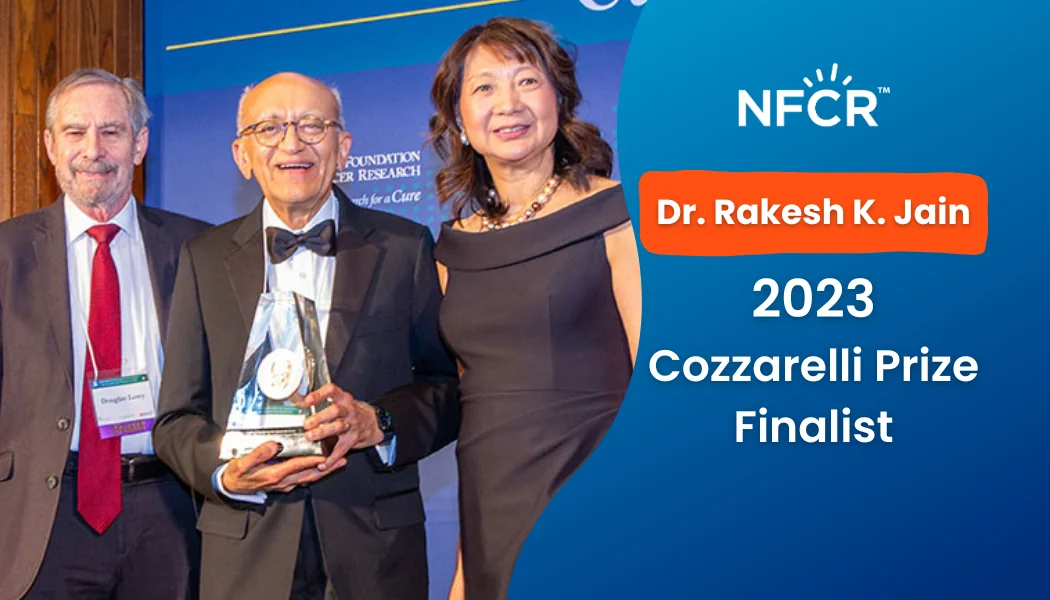NFCR-Supported Dr. Rakesh K. Jain Named 2023 Cozzarelli Prize Finalist

The National Foundation for Cancer Research is thrilled to congratulate Dr. Rakesh K. Jain, the A.W. Cook Professor of Radiation Oncology (Tumor Biology) and Director of the E.L. Steele Laboratory, on his achievement of being named the 2023 Proceedings of the National Academy of Sciences (PNAS) Cozzarelli Prize Finalist of Class IV: Biomedical Sciences. This prestigious recognition is a testament to Dr. Jain’s exceptional contributions to the field of cancer research, particularly in understanding the tumor microenvironment and its impact on treatment efficacy.
Dr. Jain’s Record of Excellence
Dr. Jain’s groundbreaking work has long been supported by the National Foundation for Cancer Research. In 2022, he was awarded the prestigious Szent-Györgyi Prize for Progress in Cancer Research, highlighting his significant contributions to the field. His research has demonstrated translational impact and has laid the groundwork for clinical trials and approvals by the U.S. Food and Drug Administration of seven combinations of anti-angiogenic drugs to improve the therapeutic window of checkpoint blockers. These combinations were designed to enhance the effectiveness of treatment in patients with lung, liver, endometrial, and kidney cancers.
Dr. Jain’s Pioneering Research Benefiting GBM Patients
Dr. Jain has been named the 2023 Cozzarelli Prize Finalist of Class IV: Biomedical Sciences for his paper titled, “Losartan controls immune checkpoint blocker-induced edema and improves survival in glioblastoma mouse models.” This work highlights Dr. Jain’s pioneering research on the use of losartan, a widely prescribed and safe antihypertensive drug, to overcome immunotherapy adverse events and enhance antitumor immune activity in glioblastoma (GBM), a highly aggressive form of brain cancer.
Despite previous failures of immune checkpoint blockers (ICBs) in GBM trials, this research highlights a promising novel approach to increase treatment safety and efficacy. It was found that ICBs can induce brain swelling (cerebral edema) in some patients and mice with GBM. By using losartan, researchers were able to prevent this edema and improve survival rates in mice when combined with standard treatment.
The study used advanced techniques like single-cell RNA sequencing and imaging to understand how losartan works. Single-cell RNA sequencing was crucial in this study as it enabled the resolution of responses at the individual cellular level, providing insights into the specific changes occurring within the tumor microenvironment in response to losartan and immune checkpoint blocker therapy (anti-PD1). They discovered that losartan reprograms the tumor microenvironment, making it more conducive to immunotherapy. Specifically, losartan reduced the inflammatory response triggered by ICBs, which was causing the edema. This reprogramming led to a significant improvement in survival rates in mice, with a cure rate of 20% increasing to 40% when losartan was combined with standard treatment. The study also identified a specific immune signature in tumors before treatment with losartan and ICBs, which predicted long-term survival. This suggests that certain patients may benefit more from this combination therapy based on their tumor’s immune profile. Overall, these findings provide a strong rationale for further clinical studies to test the combination of losartan with ICBs in GBM patients, who currently have extremely limited treatment options.
Dr. Jain’s Lifesaving Impact
Dr. Jain’s work can significantly impact the lives of GBM patients, offering hope where previous treatment modalities have failed. NFCR is proud to have supported Dr. Jain’s groundbreaking research over the years, and we extend our heartfelt congratulations on this well-deserved recognition.
A world without cancer is possible. Help us turn lab breakthroughs into life-saving realities.

5.7 Million+
Donors who have fueled NFCR’s mission

$420 Million+
Invested in high-impact research & programs

36+ Labs & Hundreds of
Nobel Laureates & Key Scientists received NFCR funding, driving breakthrough research













